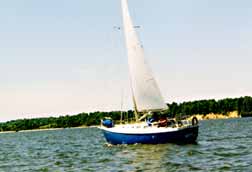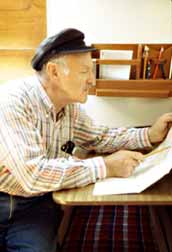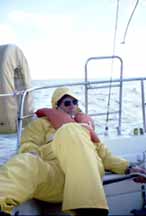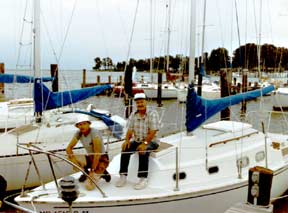 Miriah Called the Wind to Us
Miriah Called the Wind to Us
by Bob Bockting
The wind came straight out of the north, builBay Adventures:
Miriah Called the Wind to Us
by Bob Bockting
The wind came straight out of the north, building choppy seas ahead of it. Motoring with sails furled, our little ship plowed directly into those waves, pitching in a fair imitation of a bull in a Western rodeo. Like rodeo performers, our three-man crew’s role was simple: Sit tight and hang on.
On a 30–foot sloop in this kind of sea, careless lurching about is kept to a minimum. Tumbling overboard or slamming into bulkheads is definitely bad form and may result in ruined body parts. Fortunately, nature will pause occasionally. A half-dozen high, breaking waves will usually be followed by a few moderate rollers that let the crew tie down loose stuff that’s flying around, bite into a sandwich or pull up a zipper.
Now I’m just a fair sailor, but the other two guys are good. Eugene, the boat’s owner and skipper, and Albert, our third member, have raced and cruised sailboats most of their lives. People know Albert as a genuine blue-water veteran of races to Bermuda. Eugene had just bought this boat and, despite the nasty turn in the weather, we’d volunteered to help him sail her home. Home being a dock in Deale. We now faced the last and worst of three days of slam–bang wind and water.
In these conditions, I like to steer. This suits the skipper, who hopes thus to keep me out from under foot and out of trouble. The boat’s builder must have had my physical dimensions in mind. His design allowed me to wedge myself in the seat with the compass just under my nose and grip the tiller in my right fist, while planting my foot against the opposite bench. I could see well over the cabin top, yet I was shielded from most of the wind and spray.
During part of our cruise, the fore-deck leaped like the throwing arm of a catapult and was swept at intervals by glacial seas. If something needed doing up there (usually an emergency) and I was busy steering, someone else got elected to do it. So much for heroism!
We had expected, erroneously as it turned out, that yesterday, our second sailing day, would be our most challenging. It wasn’t. I’ll come to that later.
 For Need of a Bigger Boat
For Need of a Bigger Boat
"I cast myself as designated worry-wart, a role similar to designated driver in a group of revelers. He is the sober one. He must radiate caution and a hint of gloom."
- Bob Bockting, right.
This all came about because my friend, Eugene Ehrlich, needed a bigger boat. Of course, every boat owner needs a bigger boat - or thinks he does. You know. It’s got to be a little bigger so it can house an adequate head (powder room to you philistines and other non-boat people), or a larger galley, or more eating or sleeping space or to be big enough to cruise the open ocean.
On that basis, (any or all the above) Eugene’s 26-foot sloop had grown too little. He needed and bought a 30-footer. When he phoned me, he hadn’t quite bought it. He’d made an offer, subject to survey, which passed in due course. He had warned me of these developments, it being understood that I was to help sail this new acquisition from its location at Deltaville, Virginia, to Deale, a distance of just under 100 miles.
As the expedition’s designated worry-wart (a rank and title of my own choosing, the duties of which I’ll explain), I urged that we sail only in daylight, seeking safe anchorage early each evening. With that in mind, the voyage should take three days. We left our homes near Washington a day early for the drive to Deltaville.
The boat’s two former owners seemed decent fellows. The vessel appeared well cared for, and neither gentleman seemed annoyed that we had arrived an hour late. They cheerfully gave us a hands-on tour of the craft. After we’d familiarized ourselves with nearly everything, we relaxed in the cabin, out of the wind.
“Let’s not get too comfortable. There’s about a ton of stuff to haul aboard and stow away before dark,” someone said. That someone must have been Eugene or me. Albert doesn’t give orders like a first sergeant.
Stowed Away
There’s a lot of room in a 30-foot boat - that is, when compared to a 22-footer like mine. The shelves behind the bunks are big enough to really hold something. I drew the starboard bunk, which had a cubby hole at the foot, providing by day a snug spot to stow a rolled up sleeping bag and a pillow. Yes, we even had pillows.
After we finished a late dinner, Albert closed the companionway hatch boards and began messing with the radio. Wind still shrieked in the forest of masts surrounding us. Tomorrow’s forecast seemed encouraging, calling for a wind shift during the night, from north to southwest, and some drop in velocity. Small craft advisories had been in effect for a couple of days.
We agreed that if conditions got worse, we’d go home and wait for better weather. As a matter of pride, we didn’t want to do that. Someone said, “nobody knows the future - even weather forecasters - especially weather forecasters! If it’s marginal in the morning, we go.”
I lay in my bunk, listening to the night sounds of the marina: the lapping of waves, the creaking of fenders against pilings, the whine of wind in hundreds of shrouds. I pulled the sleeping bag’s hood over my head and fell asleep.
 Well Underway
Well Underway
My friend Eugene (left) needed a bigger boat. Every boat owner needs a bigger boat.
It was mid-morning. Eugene gazed straight ahead, rigidly erect as a wooden Indian. He’d stood like that close to two hours, his right arm outstretched, gripping the tiller. That stiff look meant that he was tired, but he’d never say so. Agewise, Eugene’s a bit to the north of 70, but you’d never guess it. He tackles formidable jobs like he’s 25. I tapped his shoulder and asked to steer.
I glanced at the compass and slid a thick cushion under my rear. Solid comfort, comparatively. A light pull on the tiller now and then countered the small swerve that the following seas gave to the boat’s stern. The lighthouse ahead appeared plainly, at intervals, when I could mop enough spray off my glasses. The great, menacing cloud bank off to the east seemed to be moving away, out toward the Atlantic.
Getting underway had proved easier than expected. Despite wind gusts, we threaded our way from amongst the pilings and into the channel. Approached from inland, the whitecaps on the open Bay looked formidable. Miriah took to the seas like a thoroughbred - a thoroughbred dolphin. Doubts faded. We were on our way. Albert suggested raising the small jib to steady the ship. The boat did ride more comfortably, but I think that Albert, like most sailors, just wanted the boat to heel a little and can’t abide a surface that doesn’t slant.
In early afternoon we entered the mouth of the Great Wicomoco River. We thought that the anchorages here would be the best available, short of the Patuxent River in Maryland, and we knew that we couldn’t reach there before dark. Here, anchored in a cove, we would spend the afternoon catching up on some chores on the boat.
On shore in the near distance stood a large white residence with a wide lawn sloping to a small wharf. Low hills and woodlands protected the cove. The boat rocked peacefully as the breeze whistled softly in our spars.
I spent some time on deck with camera and binoculars, assuming that the other two, with a set of instructions and a tool box, were quite enough to turn loose on one alcohol cook stove. I tried (in vain, I’m sure) to catch and fix on film the mood of that place, our quiet anchorage in that wind-swept world.
After supper, we discussed tomorrow’s prospects. We would pass the wide mouth of the Potomac, a piece of water with an ominous reputation, earned over the years by the number of shipwrecks logged in the area since colonial days.
As you recall, early on, I cast myself as designated worry-wart, a role similar to designated driver in a group of revelers. He is the sober one. He must radiate caution and a hint of gloom, and Donald Shomette’s Shipwrecks on the Chesapeake belongs in his library. A jolly wall map, exported by St. Clement’s Island-Potomac River Museum Press, shows sites of 23 shipwrecks off Smith Point and 11 sites off Point Lookout. I reviewed these references at my evening briefing. That went over big, stupefying my cohorts.
 Vicissitudes
Vicissitudes
Albert (right), like most sailors, can’t abide a surface that doesn’t slant.
We awoke to loud bagpipe music on the ship’s tape player. Our skipper meant for us to get moving a bit earlier than yesterday. We breakfasted and weighed anchor. The latter wasn’t easy. The anchor had caught on something, and it took several tries and our combined efforts to break it loose. We motored out, careful to avoid some partly submerged hulks.
When we swung out into the Bay, the wind had again shifted and now blew out of the northwest. Seas ran high, but not too steep. Albert hoisted the working jib.
“What’s the course, skipper?” I called, loud enough to be heard over the wind. Eugene came back with a heading. Most of today, we’d steer by compass. After Smith Point Lighthouse, there’d be no prominent landmarks for the next few hours. I settled in.
We sighted a large commercial ship far astern. Glancing at her at intervals, we could see that she would pass way off to starboard. Those big ships really move along compared to a sailboat. That’s one reason that I had lobbied against sailing at night. Moving lights can be confusing, and a collision with one of those big babies could spoil your evening.
The wind and seas at the Potomac’s mouth did not live up to their reputation. Either nature’s forces slackened or we got used to them. No one expressed disappointment. Albert, predictably, suggested we cut the motor and sail. The skipper, predictably concurred, and we did, very successfully and enjoyably. It was a beautiful day, the clearest and brightest any of us could remember.
Vicissitude is a word I seldom use and probably can’t spell. It’s a good word, though, and applies to much that happens on a boat trip. We had expected the day’s trip to be harrowing. It wasn’t. Once at Solomons, we expected fuel sources to be abundant. They weren’t. We motored Miriah toward the most prominent gas dock. A young woman on guard there waved us off. “We’re closed,” she shouted, “We’re out of gas.”
The next dock sported obstructions in the form of large work vessels moored across the approaches. Did I mention wind and current? Both threatened non-cooperation. After several attempts, we got the hang of it and moored. Eugene returned with the findings, “Closed: No gas!” Another session of backing and forthing and we found a dock with open pumps. Our ship had used but 13 gallons in two days running.
We headed up Rock Creek. This anchorage, like our first, proved ideal. No crowding. A few boats just for company. Protected just enough to let us rock gently and know we were on a boat - which is the reason we do this in the first place.
 In from the Wind
In from the Wind
After three days and 100 miles sailing Miriah from Virginia to Deale, owner Eugene and writer Bob Bockting relax.
Next morning we raised sail and, hugging the Patuxent’s north shore inside the shoal, we went out in style. All that changed abruptly in the open Chesapeake, outside Drum Point. Sails came down and we motored north, directly into a brisk wind. It stayed like that all day without a letup. Those steep, choppy seas just kept hitting us on the nose.
Thank God, it didn’t get any worse. As a matter of fact, I spoke to God briefly, and he seemed to be listening, for it didn’t get any worse. We were never in any peril, just a bit uncomfortable. We didn’t slow down or change course. We wanted to get that boat docked before dark, after which we could no longer have seen and avoided the crab pots that dotted our course.
Once, during the afternoon, as we changed helmsman, Eugene yelled, over the noise of the boat slamming into the seas, “Exhilarating, isn’t it?” We grinned stupidly at each other through the spray.
“Hell, yes.” I had to agree.
In Herring Bay, we found quieter water. Our keel dragged mud as we nosed into the slip, showing that the wind of the last few days, had blown most of the water out of Rockhold Creek.
The solid, unmoving dock felt strange; it would require some getting used to. I walked unsteadily the few yards to the slip where my own boat sat tethered and deposited therein my foul weather costume and life jacket. I looked at her approvingly, almost. Then I knew: I need a bigger boat.
EDITOR'S NOTE:A version of this adventure appeared in Chesapeake Bay magazine many years ago.